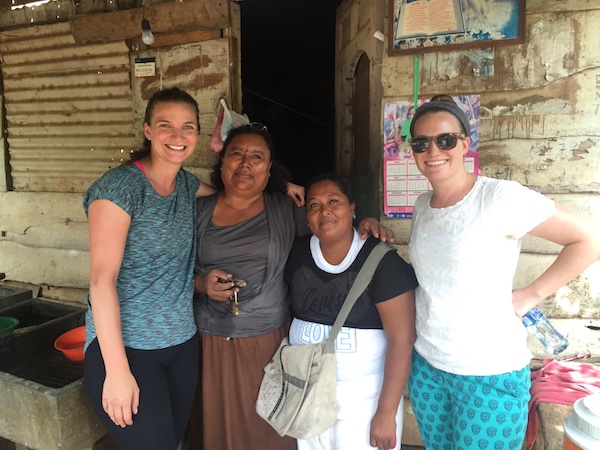International volunteer opportunities naturally attract good-hearted people who want to do service learning that feels great and helps others at the same time. Unfortunately, good intentions don’t always result in good outcomes for the recipients of this volunteer work.
There are countless studies that document unintended consequences of well intentioned people doing “good” work on short-term projects. People have time & resources to travel, and they are excited to make a difference somewhere while they have a good experience themselves. Simply matching the willing volunteer to a community in need, however, doesn’t always produce a positive result for everyone. Responsible volunteering takes a significant amount of forethought.
The types of problems that arise with international volunteer programs often revolve around providing help that enables dependency on volunteers, providing more help than is appropriate for the people you’re working with, or providing help that exacerbates hidden problems that you know nothing about. The thoughtful person thinks about these complications of helping before starting their work. Furthermore, if your helping involves working across languages and across cultures, it can be even more complicated to ascertain the best way to truly “help”.
When searching for international volunteer opportunities, most people are naturally guided by questions like: What interests me most?, What would be a good experience for me and my long-term goals?, etc. Some people would take it another step and ask the question: What skills and knowledge can I contribute & who would be best suited to benefit from them? Very few people (usually only the experienced international volunteers) ask questions that revolve around the organization and integration of the community work into local infrastructure.
It’s very important to be thoughtful about how the volunteer work you’ll be involved in will endure beyond a your time abroad, will not create dependencies among the local population, and will provide help that is appropriate and congruent with the lifestyle of populations that you’re working with. You need to investigate the infrastructure and systems that you’ll be working with in order to see how they contribute to long term benefits and appropriate helping.
Here is further explanation of the types of unintended consequences we work hard to avoid on our international Spanish immersion programs, and some things that you might like to consider as well as you search for an international volunteer opportunity:
Enabling Dependency on Volunteers: Volunteers naturally give. Whether it’s extra hands for a physical building project, financial giving, or donating items to a community, you’re giving. When giving, it’s a good idea to be aware of how your gifts either promote independence or contribute to dependencies. We all know the old Chinese proverb: You give a poor man a fish and you feed him for a day. You teach him to fish and you give him an occupation that will feed him for a lifetime. When our “giving” is done without a larger infrastructure in place that is focused on developing independence and self-sustenance, you run the risk of creating dependencies. The kinds of questions I always like to ask potential partner organizations usually relate to how their organizations seek to go beyond alleviating suffering and prepare the current (or next) generation for self-sustaining success.
Providing More Help Than Is Appropriate: Any time you have people from two drastically different socio-economic situations, their expectations for an acceptable solution to a given problem are likely to not match up. Here are some examples:
- I have a new relationship with an organization that rescues trafficked women and their children. It’s a residential facility on about 30+ acres. During the 5-year process of rehabilitation, these women and children live on the property in their own homes. The homes are intentionally not equipped with flushing toilettes because it’s not likely that the women will be able to afford them after they graduate and have their own cottage business earning a dignified living. At first I was shocked when the director told me about the toilettes, but then the wisdom of her helping strategy became clear. They didn’t have flushing toilettes before they got to the rehab facility and they won’t have them when they leave. What benefit does it do to provide them with flushing toilettes now? My own personal standards are irrelevant to their situation and shouldn’t be used as a benchmark for helping.
- Years ago, one of our medical Spanish immersion trips funded a foot-bridge so that local residents of a shanty-town could cross a river easily and get to work on the other side. This was going to eliminate the need for bus fares and drastically reduce the time away from family to get to and from work. It wasn’t an expensive project (by our standards). We built the bridge about 3ft wide with sturdy wood and nice cables to support it. It was beautiful, and we felt great about providing a safe and efficient path to work. I was shocked about 12 months later when I returned to the same community and saw that the bridge had been stripped down and rearranged so that it was one board-width across the whole river. Turns out that’s all that people needed to cross the river, not a full 3′ wide freeway. I’m pretty sure the wood from our overbuilt bridge went to good use. It was likely burned as firewood to cook beans or used to build shelter for a family. Either way, our North American minimum standard for a bridge was overkill for that community. Lesson learned!
Providing Help that Exacerbates a Hidden Problem: Do you ever wonder what the homeless guy at the intersection is going to do with the $5.00 that your heart is telling you to give him? He definitely looks hungry, but will he buy food? Or will he buy something else that doesn’t help him in the long run? Does it even matter what he does with the money? I think it does. And as impossible as it is to know what he will do with that money, it’s even harder to know the “behind the scenes” situations of the people you’re trying to help abroad. What seems like a charitable act or minuscule gift may actually be enabling or exacerbating something else. The only way to be truly helpful is to work closely with other people and organizations who live and work responsibly in the community you’re trying to help.
Short-Term Work that Undermines or Undervalues Local Resources: Have you ever asked yourself what happens to the local education authority or local healthcare system when people come in from abroad and do things drastically different from the local approach? Does that strengthen the people’s trust in the local infrastructure or weaken it? Does it give community members long-term hope in their future or bring despair with the realization that what they have access to is not good enough? Responsible international volunteering integrates with local authorities, adds to local resources and defers to local support systems. It’s the only way to provide short term help and long term hope at the same time.
From 2008 to 2010 we began to grow a little uneasy with the work we were doing abroad on our Spanish immersion programs. That’s when we decided to be more intentional about our international volunteer work. Here is an example of the guiding values we put into place for our medical Spanish immersion trips. Similar values guide our other Spanish immersion programs as well.
International volunteering is an amazing opportunity for people young and old. Doing charity and being charitable is a beautiful way to live your life. But it’s not as easy as simply lending a hand to someone in need. You have to be intentional with your volunteer work in order to not produce unintended consequences for the communities you work in.
[button link=”https://commongroundinternational.com/immersion-in-costa-rica/10-international-travel-suggestions/” style=”info” color=”red”]International Travel Suggestions: 10 Tips for your next trip[/button]





Pingback: International Travel Suggestions: 10 Tips for your next trip